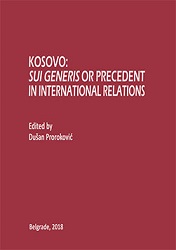CRIMEA AND KOSOVO: THE BREAKDOWN OF THE POST-COLD WAR EUROPEAN NOMOS
CRIMEA AND KOSOVO: THE BREAKDOWN OF THE POST-COLD WAR EUROPEAN NOMOS
Author(s): Richard Sakwa
Subject(s): Law, Constitution, Jurisprudence, Constitutional Law, International Law, Human Rights and Humanitarian Law
Published by: Институт за међународну политику и привреду
Keywords: Crimea; Kosovo; nomos; revisionism; neo-revisionism; Russia
Summary/Abstract: The transfer of Crimea from Ukrainian to Russian jurisdiction in March 2014 has been justified by the antecedent breakdown of authority in Kiev and a popular referendum. Opponents argue that the Crimean referendum was illegal without the sanction of the host state, and the annexation of the territory of another state represents the repudiation of the foundations of the post-war internal order. Kosovo has been used as a precedent in all the discussions. In both the Kosovo and Crimean cases, law and politics combine and collide. For Crimea, the context is the breakdown of the post-Soviet nomos (spatial order) and the broader post-Cold War European security system. Today, all of Europe can be considered to be locked in a protracted (‘frozen’) conflict. In response, Russia became a neorevisionist power, criticising the practices of the Atlantic powers, but not the normative framework of the international system. The repatriation of the territory was a symptom and not the cause of the breakdown of an international legal order. Russia’s actions were not part of a long-term revisionist strategy but represented a revisionist act reflecting anger over events in Kiev and the impasse in European international affairs. The Crimean events are best seen not as a rights-based remedial case, but as part of a geopolitical conjuncture – the continuing failure to achieve a viable and inclusive security order in post-Cold War Europe.
Book: KOSOVO : sui generis or precedent in international relations
- Page Range: 32-53
- Page Count: 22
- Publication Year: 2018
- Language: English
- Content File-PDF

